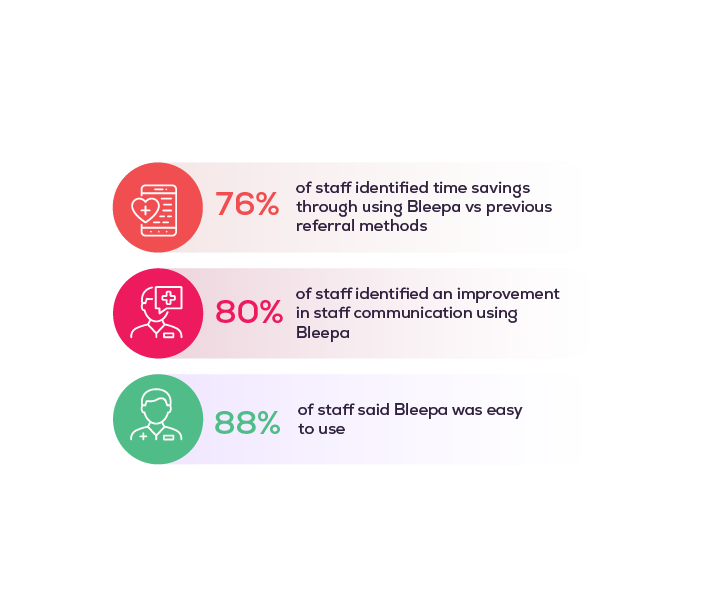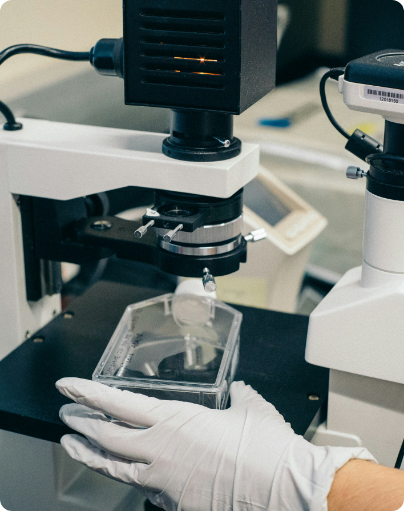

Effective asynchronous communication
Multi-disciplinary team meetings are estimated to cost the NHS around £130 million per year with over 55,000 meetings taking place. The total time consultants spend in relation to these meetings is nearly 1.2 million hours, equivalent to around 550 consultants. Coordinating face-to-face multi-disciplinary team meetings can be difficult and expensive when these conversations have to happen synchronously.
Bleepa®’s clinical-grade image sharing combined with its asynchronous communication supports efficient, cost-effective multi-disciplinary team working across care settings – approximately 40% of multi-disciplinary team cases could be dealt with asynchronously, which could equate to 480,000 hours and £52m saved if the time saved is reappropriated across the NHS.
In asynchronous communication, messages are sent to colleagues who in turn reply in and around their other clinical commitments; a radiologist can message a surgeon about a patient, who can then reply between theatre cases. Team working now fits around clinical work rather than vice versa.

Better patient outcomes
Whilst a more efficient way of working is great for clinicians, the real reward is for patients. Patients no longer need to wait for the next multi-disciplinary team slot for their treatment to be discussed and progressed along the care pathway. By dealing with more cases as soon as the diagnostic results are available – asynchronously – more time could be freed up to deal with the more complex cases in traditional face-to-face or virtual meetings.
By dealing with approximately 40% of cases asynchronously using Bleepa®, this could save the equivalent of 2,232 hours and £241,860 per acute hospital trust.
The process can start straight away, accelerating investigation and treatment – helping to drive down any backlog by accelerating pathways.

Time and cost savings for multidisciplinary team meetings
Multidisciplinary team (MDT) meetings are still an essential part of managing care for patients with complex conditions. However, MDTs can be more efficient and effective with asynchronous working. Less complex cases can be dealt with more rapidly outside of the traditional face-to-face or virtual meeting setting.
Calculate what your organisation can save with asynchronous MDT tools.
We need to maximise senior clinical time within the NHS and traditional MDTs cost a great deal of time and resource to all involved.
Using digital technology like Bleepa® to deliver asynchronous MDTs, with the flexibility for clinicians to contribute when it’s most convenient and as soon as results are available, is so much more valuable for the most efficient, effective patient care.

Streamlined multi-disciplinary team meetings for cancer
A 4-week delay in treatment leads to increases in mortality across all common forms of cancer. Whilst 71.9% of trusts are meeting faster diagnosis standards for cancer, improvements still need to be made to meet national targets.
Bleepa®’s bi-directional asynchronous chat removes time barriers and enables clinicians to discuss treatment as soon as results are available, which frees up clinical time for multi-disciplinary team meetings to focus on more complex cases.
Find out more about how Bleepa® can support cancer alliances to meet diagnosis standards.

Improve team communication
An independent evaluation of Bleepa® at the Northern Care Alliance showed significant benefits in terms of clinical communication, with 80% of surveyed staff identifying an improvement in communication when using Bleepa® compared to previous referral methods.
The report showed an average of 4.8 messages are exchanged per referral whilst using Bleepa®, enabling clinicians to progress care in a more efficient way.



